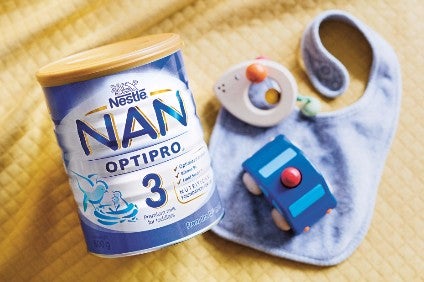
Some of the world’s largest baby formula producing companies have defended themselves against accusations from UK charity Save the Children that they aggressively market their products to mums.
London-based Save the Children says the leading six milk formula companies spend GBP36 (US$49.4) on marketing for every baby born every year , or GBP5bn in total, which, it claims, violates rules and threatens lives.

Discover B2B Marketing That Performs
Combine business intelligence and editorial excellence to reach engaged professionals across 36 leading media platforms.
It suggests the companies – Nestle; Danone; Reckitt Benckiser, the owner of Mead Johnson; Abbott Laboratories; Kraft Heinz; and FrieslandCampina – “routinely violate” a World Health Organization (WHO) code set up to stop aggressive marketing to new mums.
The two companies which the charity suggests are the worst offenders – Nestle and Danone – responded to the allegations.
Nestle said “the allegations made in the report do not represent Nestle’s culture and business practices,” while French dairy heavyweight Danone said it is “fully committed to ensuring that marketing of our products does not negatively affect the choice and ability of mothers to breastfeed”.
Save the Children draws a picture of parents bombarded with advertisements, including false health claims and social media promotions, and doctors reportedly receiving gifts and incentives to promote infant formula.

US Tariffs are shifting - will you react or anticipate?
Don’t let policy changes catch you off guard. Stay proactive with real-time data and expert analysis.
By GlobalDataIts report – Don’t push it: Why the formula milk industry must clean up its act – says 823,000 child deaths could be prevented each year by near universal breastfeeding, yet marketing spend by just six breast milk substitute companies dwarfs public health budgets to promote breastfeeding.
It says millions of families – many in low-income settings – have fed their babies formula they do not need and very often cannot afford.
The charity ranks the six companies based on WHO code compliance and is calling on manufacturers, investors and governments to commit to putting an end to what it describes as “dangerous marketing practices”.
The WHO code states there should be ‘no promotion to the public’ of breast milk substitutes because of incontrovertible evidence that breastfeeding provides children with the best start in life.
Kevin Watkins, Save the Children UK CEO, said: “Today’s report uncovers a ‘battle for baby bucks’ in which companies are deliberately using aggressive marketing to create a fog of uncertainty around breastfeeding.
“This a first in the history of human evolution. Never before has the way babies and small children are nourished changed so dramatically and on such a scale.
“It’s a matter of life and death – there is little doubt many babies in low and middle income settings are dying as a result. It’s time the breast-milk substitute industry put babies before profit.
“With the right commitment these companies can show the leadership needed to change the industry. We are hopeful this will be the wake-up call they need to do so.”
Save the Children is calling for the companies highlighted to publicly and unequivocally commit to upholding the WHO code and agree to meet targets set to achieve full compliance.
It also wants governments to incorporate the code and subsequent resolutions fully into their laws and regulations.
In response to the report, Nestle said: “The first and most fundamental expression of our respect for mothers and babies is support for breastfeeding and compliance with the law and our own strict procedures.
“We strongly reject the allegation that the company does not comply with its legal obligations and the WHO Code as implemented in national law.”
However, Nestle stressed if Save the Children passed on details of the allegations of incidents of non-compliance in its report it will take “fast and decisive action if any wrongdoing is found”.
Danone was also quick to refute the allegations against the company contained in the report.
It said: “We inform parents and care-givers that our research is inspired by breast milk, and that this has enabled us to develop our products. Insight in the composition, structure and functionality of ingredients found in breast milk helps us to better understand the early life nutritional needs of infants and develop optimal nutrition for infants.
“We do not idealise the use of our products in any way, nor imply that they are superior or equivalent to breast milk.
“We support the WHO public health recommendation calling for exclusive breastfeeding for the first six months of age, and continued breastfeeding for up to two years and beyond combined with the safe introduction of appropriate complementary foods.”
But Danone acknowledged it is “possible that isolated instances of non-compliance with our policy and instructions at local level may occur which we actively remediate”.
Approached by just-food for comment, Kraft Heinz provided a statement. It said: “Kraft Heinz recognises the importance and the superiority of breast milk in feeding infants and young children. As outlined in our company policy, Kraft Heinz has developed a worldwide charter of practice for consistent marketing of breast-milk substitutes where we have a baby food business. The aim is to support breast-feeding and, when breast-feeding cannot be provided, to outline principles and requirements to provide safe and adequate nutrition for infants and young children.”
Meanwhile, a spokesperson for Dutch dairy co-op FrieslandCampina said: “The conclusions in the report are largely based on the Global Access to Nutrition Index of the Access to Nutrition Foundation published in 2016. Last year FrieslandCampina updated its policy, standard and guideline for the marketing of infant foods; for this update the results of ATNI 2016 were taken into account.”
The spokesperson declined to comment further.
Officials at Reckitt Benckiser and Abbott had not returned requests for comment at the time of writing.





